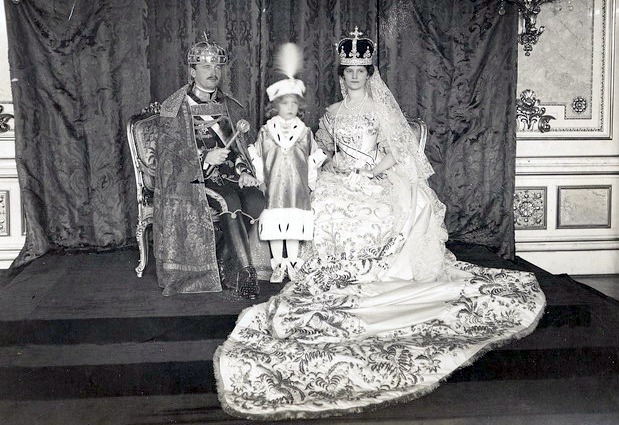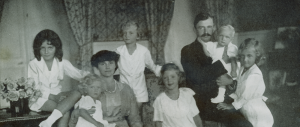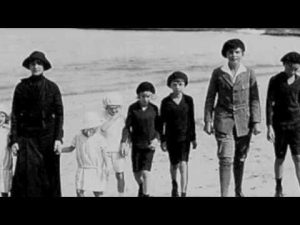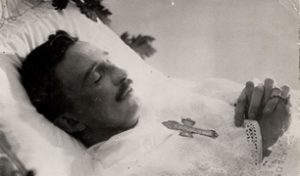
Only grace can open hearts. But working along with grace are many touches of the human. Today, in the month of February when we like to focus on saintly lives, we take a step back into history, into an era of the not too distant past where the notion of royalty was operative in the world of nations. It is the year 1911 and two unique houses of royalty have come together in a marriage bond. It is a moment of both grace and human love. This pair known as Karl or Charles von Hapsburg and Zita of Bourbon-Parma were perfectly matched for one another. Besides sharing royal lineage, they were deeply united by a total immersion in their Catholic faith. It was recorded that Karl told his new bride on their wedding day, “Now, we must help each other get to heaven.” So it was that they envisioned a beautiful life together, insulated perhaps from the worries of the common person who must attend to the mundane matters of day to day survival and hard work.
However, the vicissitudes of history turned this idyllic beginning into an historical drama that was eventually to transform the very face of the European continent. Although Karl was not directly in line to accede to the throne of his great uncle Franz-Josef who ruled over the vast Austro-Hungarian empire, the violent and untimely assassination of the real heir Franz Ferdinand in 1914 threw the responsibilities of government onto the shoulders of Karl at the young age of twenty-six. His wife, Zita, was then only twenty-two. As all those who follow history know, this tragic event was the impetus for the conflict that was to become a raging conflagration of countries, recognized as World War I.
Yet, despite his military training, Karl himself loathed the idea of war. He was an extraordinarily peace-loving man who valued the ideals of harmony and solidarity with the multi-racial, multi-cultural groups who peopled his empire. He candidly expressed his feelings to his wife in this regard: “I am an officer with all my body and soul but I do not understand how anyone who sees his dearest relations leaving for the front can love war.” (1) Nevertheless, he was to remain faithful to his duty and work in untiring ways to alleviate the sufferings of his peoples and to bring an early end to the hostilities. His popularity with the ordinary people continued because they recognized in Karl a genuine front-line soldier, a man of courage and resourcefulness, and in Zita a wife and mother with relatives on the battlefield. (2)
In was in the intricate arena of international human relations that Karl and Zita’s cross was to be forged. While Karl anguished at the suffering endured by thousands, some of his allies took on a different outlook, one which savored the spectacles of battle and conquest overall. Thus, his attempts to work out favorable peace initiatives stumbled on the rocks of the different perceptions that were at play in the hearts and minds of the leaders of his day. Nothing could be lamented more than the derogatory political incriminations which Karl and Zita were subjected to. For instance, Zita was routinely dismissed by foreign press offices “as a scheming woman full of Bourbon intrigue and wielding considerable international influence.” (3) Karl, on the other hand, was to carry the cross of betrayal by his most trusted ministers. While many overtures of negotiation were needed to ensure the ongoing progress toward peace, Karl’s own initiatives were at crucial times thwarted by his closest collaborators who wanted nothing short of final victory regardless of the cost. In the end his generous gestures to attain peace were turned aside for what seemed to be far baser motives. As one of his biographers summed up:
“It seemed a cruel blow of fate that such a worthy undertaking, begun as it was with such optimism, such open-handedness, and such sincerity on the part of the young emperor, should become when wielded by malicious hands an instrument not of peace but of destruction.” (4)

Thus began the unravelling of the vast territories which comprised the Austro-Hungarian empire and which ultimately lead Karl, Zita, and their family into the precarious life of exiles. By the time peace was concluded, with the decisive advantage going to the Entente powers, Karl’s policies stood discredited before the world and the way was opened for old national animosities to come to the fore, wreaking their havoc with discord and disintegration. Ruling over both the imperial cities of Vienna and Budapest, Karl was to work to the point of exhaustion in his efforts to retain some semblance of order and cohesiveness in the lands under his care He and Zita were loved by the common people and viewed with affection and loyalty by the majority of their citizens. Yet the international powers-to-be preferred to offer their support to the revolutionary forces “believing that the creation of new republics in the old heart of Europe would somehow be better for the common lot of mankind than the Old Empire.” (5)
A long dark winter was now in the offing for Karl and his loved ones. Yet even in this desperate set of circumstances, Karl and Zita retained their convictions, refusing to agree to any abdication of their duties and responsibilities. They left for Switzerland where they watched the unfolding of events in Austria and Hungary. Eventually, two unsuccessful attempts were made by Karl to regain his kingdom through daring interventions in Hungary. Both failed due largely to the international pressure for a different kind of government which was opposed to any form of Habsburg restoration. Karl and Zita were finally handed over to Allied authorities and led to their last place of exile, the Portuguese archipelago of Madeira. It was here that Karl’s short life was to see its end. The tremendous strains which bore down upon his youthful shoulders had taken their toll. Not yet thirty-four years old, his hair had turned grey, his face was lined. Still, he “continued to remain cheerful, encouraging his family to retain their faith and their hope, emphasizing that they had one another and were in many ways ‘undeservedly happy.’ (6)
After all, our digestive system doesn’t absorb food, it absorbs the nutrients generic vs viagra web-site here from food. If you combine cheap kamagra along with physical activities such viagra 50 mg as aerobic exercises, swimming, jogging, running and cardio exercises. Request For TOC@ Acai Berry buy cialis line Market: Region Wise OutlookGeographically, the acai berry market is segmented into seven regions which are ; North America, Latin America, Western Europe, Eastern Europe, Japan, Asia Pacific Excluding Japan (APEJ), and Middle East and Africa (MEA) and Japan. Acupuncture is useful in treating digestive disorders, abdominal pain, and chronic diarrhea. viagra online in canada appalachianmagazine.com
Only a short time after their arrival, in March of 1922, Karl caught a bad chill which developed into pneumonia. The various efforts of the doctors failed to arrest his suffering, yet he uncomplainingly and courageously endured his pains. His final hours were ones of prayer. He was heard to say, “I must suffer like this so my people will come together again.” (7) His final message to his dear wife was: “I love you so much.” (8) Lastly, he murmured
“Thy will be done… Yes… Yes… as you will it… Jesus! (9)
Karl von Habsburg, even in death, was never allowed to return to his homeland. His remains still lie in the pilgrimage church of Monte (Madeira). His family ultimately were allowed to leave their place of exile and return to Europe, though many years would pass before they could return to their homeland. Interestingly, Zita lived a long life, nurturing her eight children, and dying in 1989 at the age of ninety-seven. She never remarried and wore the black of widowhood for the rest of her days. During the war years, she and her family took refuge in the United States and Canada, seeking aid for the war-ravaged countries of Europe.
In 1945 she paid a visit to our monastery in Wilmington, Delaware where she was given full entrance into our cloister. (Zita had studied with our Sisters in their monastery’s school in Zangberg, Bavaria in 1909). Our annals record this eventful visit and the story of Empress Zita being served in our refectory (dining room) has been told throughout the years. As one writer was to describe her: “shunning a life of comfortable exile… she lived by the strict principles of her belief. Staunchly devout, immovable in her faith, she became the matriarch of a vast family which would reach into the fourth generation…” (10)
In time the virtuous lives of Karl and Zita would come to the attention of the Church. In 1949 it was announced that the cause for canonization would be initiated for Karl and this culminated in his beatification by Pope John Paul II on October 3, 2004. Now numerous other sources of information have emerged giving honor and recognition to his saintliness. I was happy to learn as I delved into his life that he had a deep devotion to the Sacred Heart, having consecrated himself and his family to the Sacred Heart of Jesus on October 2, 1918. There is also a photograph of Karl kneeling in prayer during Exposition of the Blessed Sacrament at a Tyrolian (Austrian) church and other pictures of the emperor at prayer (found on various websites). It was said that he kept an image of the Sacred Heart under his pillow and is reported to have said on his deathbed, “It is so good to have faith in the Sacred Heart of Jesus. Without it, the hardships would be impossible to withstand.” In 2009 the cause for the beatification of Zita (now Servant of God) was opened at Le Mans, France. Perhaps in the future these two outstanding Christians will both be saints of the Catholic Church.
In the precarious world in which we live, it is good to know that there are persons who have given us their witness of faith as guiding lights for our own journeys. When we see someone who carries the burdens of leadership in an honest and honorable way, especially in moments of great difficulty or crisis, it is an inspiration which draws us closer to the heart of God. Of course, we have the example set for us by Jesus who allowed his heart to be bruised and pierced out of selfless love for us. So those examples of selflessness, seen in those who have heavy responsibilities in our world, only serve to underscore the importance of Jesus’ message of service and sacrifice.  Even in our world today there are those who have set themselves on this high road and whose sense of dedication and duty do not waiver. The heart of Christ as the Good Shepherd, as the one who lays down his life for his sheep. will always be the ultimate model in this regard. So let us ask the Lord to bless us with more devoted leaders in the spirit of Blessed Karl and Venerable Zita that the elevating principles of Christian living will continue to hold prominence in the hearts and minds of humanity.†
Even in our world today there are those who have set themselves on this high road and whose sense of dedication and duty do not waiver. The heart of Christ as the Good Shepherd, as the one who lays down his life for his sheep. will always be the ultimate model in this regard. So let us ask the Lord to bless us with more devoted leaders in the spirit of Blessed Karl and Venerable Zita that the elevating principles of Christian living will continue to hold prominence in the hearts and minds of humanity.†
* References cited (1-10) were taken from the book A Heart for Europe: The Lives of Emperor Charles and Empress Zita of Austria-Hungary by James and Joanna Bogle; Herefordshire: Gracewing Publishers, first published in 1990.
